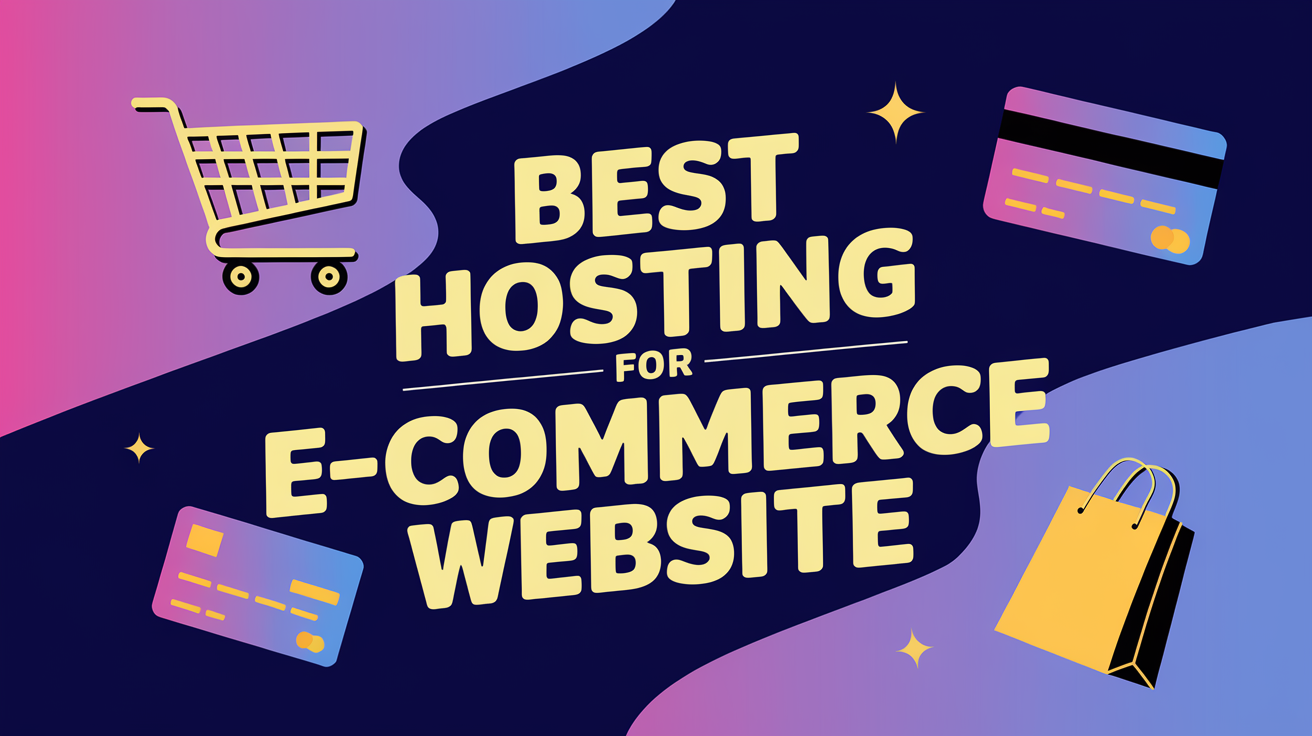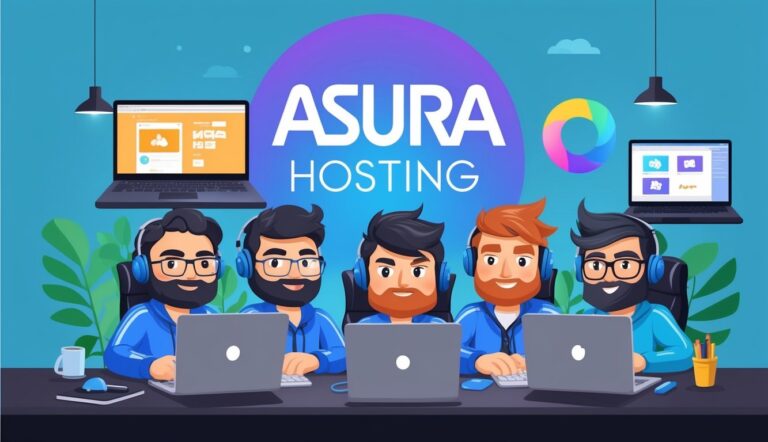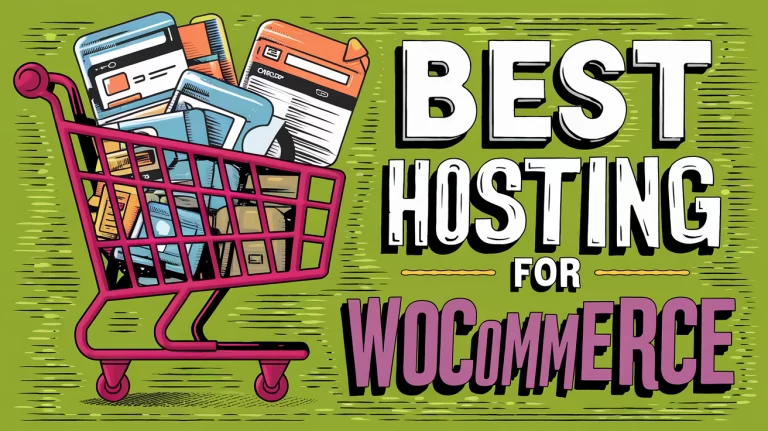Best Hosting for E-commerce Website: Top Picks for Online Sellers

Hey folks! Today we’re diving into the world of e-commerce hosting. If you’re looking to start an online store or upgrade your current setup, you’ve come to the right place. I’ve got all the info you need to make an informed decision.

Finding the right e-commerce hosting provider can make or break your online business. It’s not just about having a website – you need speed, security, and features that’ll help your store grow. I’ve done the research and tested out the top options, so you don’t have to. Let’s explore what makes a great e-commerce host and which ones stand out from the crowd.
1) Shopify
I’ve gotta say, Shopify is a powerhouse when it comes to e-commerce hosting. It’s not just a hosting provider; it’s a complete platform that takes care of everything you need to run an online store.
One thing I love about Shopify is how user-friendly it is. You don’t need to be a tech whiz to set up your store. They’ve got a drag-and-drop store builder that makes creating your site a breeze.
But here’s where it gets really cool: Shopify uses a content delivery network (CDN). What does that mean for you? Lightning-fast loading times for your customers, no matter where they are in the world.
Security is another big plus. Shopify includes SSL certificates with all their plans, so your customers’ data stays safe. Plus, they handle all the technical stuff like updates and security patches.
Now, let’s talk pricing. Shopify’s plans start at about $29 a month, which isn’t the cheapest out there. But remember, you’re getting a whole lot more than just hosting.
Pros:
- All-in-one e-commerce solution
- User-friendly interface
- Fast loading times with CDN
- Robust security features
Cons:
- Can be pricier than basic hosting
- Less flexibility for customization
Want to dive deeper? Check out Shopify’s features for yourself!
2) BigCommerce
I’ve got to tell you, BigCommerce is a real powerhouse when it comes to e-commerce hosting. It’s not just another platform; it’s a complete solution that’s got everything you need to launch and grow your online store.
What I love about BigCommerce is how user-friendly it is. Even if you’re not a tech whiz, you can get your store up and running in no time. The drag-and-drop builder is a breeze to use, and there are tons of professional-looking themes to choose from.
But here’s where it gets really exciting – the features! BigCommerce offers robust tools for inventory management, order processing, and customer engagement. It’s like having a Swiss Army knife for e-commerce.
One thing that really stands out to me is the scalability. Whether you’re just starting out or running a big operation, BigCommerce can handle it. Plus, their SEO tools are top-notch, helping your products get found by potential customers.
Pros:
- Easy to use
- Feature-rich
- Scalable for businesses of all sizes
- Excellent SEO tools
Cons:
- Can be pricier than some alternatives
- Learning curve for advanced features
Want to learn more? Check out BigCommerce’s official website for all the juicy details!
3) WooCommerce
WooCommerce is an absolute game-changer for e-commerce websites! I’ve seen countless online stores thrive with this powerful plugin. It’s free, open-source, and integrates seamlessly with WordPress.
What I love about WooCommerce is its flexibility. You can sell anything from physical products to digital downloads and even subscriptions. The customization options are practically endless!
Setting up your store is a breeze. The intuitive interface makes it easy to add products, manage inventory, and process orders. Plus, there’s a huge ecosystem of extensions to enhance your store’s functionality.
One of my favorite features is the built-in analytics. You can track your sales, customer behavior, and store performance right from your WordPress dashboard. It’s like having a personal business analyst!
Security is top-notch too. WooCommerce takes payment security seriously, offering various secure gateway options to keep your customers’ data safe.
Pros:
- Free and open-source
- Highly customizable
- Huge selection of themes and plugins
- Strong community support
Cons:
- Can be resource-intensive on shared hosting
- Some advanced features require paid extensions
Want to learn more? Check out the official WooCommerce website for all the juicy details!
4) Magento
I’ve gotta say, Magento is a powerhouse when it comes to e-commerce platforms. It’s packed with features that’ll make your online store shine. But here’s the kicker – it needs some serious hosting muscle to run smoothly.
When I’m looking for Magento hosting, I want something that can handle its resource-hungry nature. Magento-optimized hosting providers often offer specialized plans that are fine-tuned for peak performance.
One thing I love about Magento hosting is the scalability. As your store grows, you can easily upgrade your hosting plan to keep up with increased traffic and sales. It’s like having a supercharged engine that grows with your business!
Security is another big plus. Many Magento hosts offer enhanced security features to keep your store and customer data safe. It’s like having a virtual bodyguard for your e-commerce site.
Pros:
• Optimized for Magento performance
• Scalable as your business grows
• Enhanced security features
Cons:
• Can be more expensive than general hosting
• Requires more technical know-how
Want to dive deeper into Magento hosting options? Check out this comprehensive guide for more info!
5) Squarespace Commerce
I’ve gotta tell you, Squarespace Commerce is a pretty nifty option for setting up an online store. It’s part of the Squarespace website builder, which is known for its sleek designs.
What I love about Squarespace Commerce is how easy it makes creating an ecommerce website. You can jump right in, pick a template, and start adding your products. It’s super user-friendly, even if you’re not a tech whiz.
One cool feature is the ability to run your online store from anywhere using their app. I can track inventory and chat with customers while I’m on the go. It’s like having a store in my pocket!
The customization options are pretty sweet too. I can tweak categories and content to make my store look just how I want it. And let’s not forget about those gorgeous templates – they really make your products pop!
Pros:
- Beautiful templates
- User-friendly interface
- Mobile app for on-the-go management
Cons:
- Limited payment gateways
- Can be pricier than some competitors
Want to learn more? Check out Squarespace’s ecommerce features for all the details!
6) Wix eCommerce
I’ve gotta say, Wix eCommerce is a pretty slick option for setting up an online store. It’s super user-friendly, which is great if you’re not a tech whiz like me.
The drag-and-drop editor is a blast to use. I can whip up a professional-looking site in no time! Plus, there are tons of eCommerce website templates to choose from.
One thing I really dig is how Wix handles all the techy stuff behind the scenes. I don’t have to worry about hosting or security – it’s all taken care of.
They’ve got some cool features too, like abandoned cart recovery and multiple payment options. And get this – you can sell up to 50,000 products on their basic plan!
The pricing is pretty reasonable. Starting at $29 per month, it’s a solid deal for what you’re getting.
Pros:
- Easy to use
- Lots of templates
- Built-in hosting and security
- Affordable pricing
Cons:
- Limited customization compared to some competitors
- Transaction fees on some plans
Want to learn more? Check out the complete guide to making a Wix eCommerce site.
7) Weebly eCommerce
Let me tell you, Weebly eCommerce is a fantastic option for those looking to set up an online store without breaking a sweat. I’ve played around with it, and I’m impressed by how user-friendly it is.
With Weebly, you can create an online store in no time. They’ve got everything you need – from choosing a design theme to adding products and setting up shipping. It’s like they’ve thought of everything!
One thing I love about Weebly is their mobile app. It’s got a solid 5-star rating, and I can see why. You can manage your store on the go, which is perfect for us busy entrepreneurs.
Now, let’s talk pricing. Weebly’s eCommerce plans are pretty competitive. When I compared them to other big names like Shopify and BigCommerce, I found Weebly to be more budget-friendly.
But hey, don’t just take my word for it. Here’s a quick pros and cons list:
Pros:
- Easy to use
- Mobile-friendly
- Affordable pricing
- Free hosting included
Cons:
- Limited customization options
- Fewer advanced features than specialized eCommerce platforms
Want to dive deeper? Check out Weebly’s eCommerce features for more info!
8) Volusion
Hey folks! Let’s talk about Volusion, one of the oldest players in the e-commerce game. I’ve gotta say, this platform has some seriously cool features for hosting your online shop.
First off, Volusion offers powerful e-commerce tools that make selling a breeze. We’re talking inventory management, payment collection, and unlimited product options – all in one neat package!
But wait, there’s more! Volusion doesn’t just stop at selling. They’ve got built-in SEO management, newsletters, and even a CRM system. It’s like they’ve thought of everything to help you grow your biz.
Now, let’s talk design. Volusion has some beautifully crafted templates that’ll make your store look super pro. I’m talking eye-candy levels of good-looking here!
Pricing-wise, Volusion offers different plans to fit your needs. They start at $35 a month and go up to $299 for the big guns. Not too shabby, if you ask me!
Pros:
- All-in-one e-commerce solution
- Beautiful templates
- Powerful selling features
Cons:
- Can be pricey for larger businesses
- Learning curve for beginners
Want to know more? Check out Volusion’s website for all the juicy details!
9) PrestaShop
Alright folks, let’s talk about PrestaShop hosting! If you’re running an online store, this open-source e-commerce platform is a fantastic choice. It’s packed with features to help you sell products like a pro.
When it comes to hosting PrestaShop, you’ve got some great options. I’m excited to share that many providers offer specialized PrestaShop hosting solutions. These are designed to keep your store running smoothly and efficiently.
One thing I love about PrestaShop hosting is the easy setup. Many hosts provide one-click installations, so you can get your store up and running in no time. It’s like magic!
But wait, there’s more! The best PrestaShop hosts also offer features like unlimited module integrations and scalability. This means your store can grow as big as your dreams!
Pros:
- Easy setup with one-click installations
- Specialized hosting for optimal performance
- Scalable solutions for growing businesses
Cons:
- May be pricier than basic hosting plans
- Requires some technical know-how to fully optimize
Want to dive deeper? Check out PrestaShop’s official hosting page for more info!
10) OpenCart
OpenCart is a popular choice for e-commerce websites, and I’ve got to say, it’s pretty impressive! This open-source platform is designed to make setting up an online store a breeze.
One thing I love about OpenCart is how user-friendly it is. Even if you’re not a tech whiz, you can get your store up and running quickly. It’s got a clean interface that’s easy to navigate, which is a huge plus in my book.
The platform comes with a ton of features right out of the box. You’ve got product management, order tracking, and even multi-currency support. It’s like they’ve thought of everything!
I’m also a big fan of OpenCart’s flexibility. There are tons of themes and extensions available, so you can customize your store to your heart’s content. Want to add a new payment gateway or change your store’s look? No problem!
When it comes to hosting, you’ve got options. Many providers offer specialized OpenCart hosting, which can make your life a lot easier. These plans often come with one-click installs and optimized servers for better performance.
Pros:
- User-friendly interface
- Lots of built-in features
- Highly customizable
- Large community support
Cons:
- Can be slow without proper optimization
- Some features require paid add-ons
Want to learn more? Check out the official OpenCart website for all the details!
What to Look for in E-commerce Hosting
When choosing e-commerce hosting, I’ve found that a few key factors can make or break your online store’s success. Let’s dive into the must-have features that’ll keep your site running smoothly and your customers happy!
Performance and Speed
Speed is king in e-commerce! A fast site keeps shoppers browsing and buying. Look for hosts that offer solid-state drives (SSDs) and content delivery networks (CDNs). These tech goodies can seriously boost your site’s performance.
I always check for uptime guarantees too. You want a host that promises 99.9% uptime or better. Every second of downtime is lost sales, folks!
Here’s a pro tip: opt for hosts with server locations close to your target audience. It’s like giving your data a shortcut to your customers’ screens!
Don’t forget about load times. A good host should help your pages load in under 3 seconds. Any longer, and you’ll see shoppers bouncing faster than a rubber ball!
Security Features
Let’s talk security – it’s not just for tech nerds anymore! Your e-commerce site needs Fort Knox-level protection. Look for hosts offering SSL certificates – they’re like digital bodyguards for your customers’ data.
Automated backups are a must. Trust me, you’ll thank yourself later if things ever go sideways. I always check if a host provides malware scanning and removal too. It’s like having a 24/7 security team watching your digital back.
Two-factor authentication is another biggie. It’s an extra lock on your store’s front door. And don’t forget about DDoS protection – it’s like a forcefield against those pesky cyber attacks.
Scalability Options
Your online store is gonna grow – trust me on this one! You need a host that can keep up. Look for plans that let you easily upgrade resources like bandwidth and storage.
I’m a big fan of hosts that offer cloud hosting options. They’re super flexible and can handle traffic spikes without breaking a sweat.
Check if the host supports multiple databases and allows you to add extra domains. As your business expands, you might want to launch new sites or apps.
Also, keep an eye out for hosts with built-in caching and load balancing. These features are like turbochargers for your site when traffic revs up!
Comparing Shared and Dedicated Hosting
When it comes to e-commerce hosting, you’ve got two main options to choose from: shared and dedicated. Let’s break down the key differences so you can figure out which one’s right for your online store.
Advantages of Shared Hosting
Shared hosting is like living in an apartment building – you’re sharing resources with other websites. It’s super budget-friendly, which is great when you’re just starting out. I’ve seen some providers offer plans for as low as a few bucks a month!
You don’t need to be a tech wizard either. The hosting company takes care of all the backend stuff, so you can focus on selling your products. Plus, it’s usually a breeze to set up – perfect for getting your store online quickly.
One thing I love about shared hosting is the scalability. As your business grows, you can easily upgrade to more powerful plans without any hassle. It’s like leveling up in a video game, but for your website!
Advantages of Dedicated Hosting
Now, dedicated hosting is like owning your own house. You get the whole server to yourself, which means ultimate control and performance. If you’re running a big e-commerce site with tons of traffic, this is where you want to be.
With dedicated hosting, you can customize everything to your heart’s content. Want to install specific software? Go for it! Need to tweak server settings for optimal performance? It’s all yours!
Security is another big win here. You’re not sharing space with other websites, so there’s less risk of cross-contamination if someone else’s site gets hacked. For e-commerce, where you’re handling sensitive customer data, that extra peace of mind is priceless.
The performance boost is seriously impressive. I’ve seen sites load lightning-fast on dedicated servers, which can make a huge difference in conversions and search engine rankings.
Hosting Providers with Excellent Customer Support
Let me tell you, when it comes to e-commerce hosting, customer support can be a real lifesaver! I’ve seen my fair share of technical hiccups, and having a responsive support team is crucial.
IONOS stands out as a top contender. They offer 24/7 customer support through multiple channels, including phone and live chat. I love that I can get help anytime, day or night.
Another fantastic option is Bluehost. They’re known for their stellar support, especially when it comes to booking appointments. If you’re running a service-based e-commerce site, these guys have got your back.
But wait, there’s more! Check out this quick comparison of some top providers:
| Provider | Support Channels | Availability |
|---|---|---|
| IONOS | Phone, Live Chat | 24/7 |
| Bluehost | Phone, Live Chat, Email | 24/7 |
| HostGator | Phone, Live Chat, Email | 24/7 |
HostGator deserves a shout-out too. They’re great for businesses on a budget but don’t skimp on support quality.
Remember, good support isn’t just about availability. It’s about:
- Quick response times
- Knowledgeable staff
- Clear communication
I can’t stress enough how important these factors are when you’re trying to keep your online store running smoothly!






